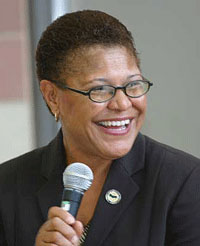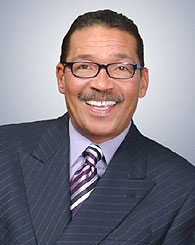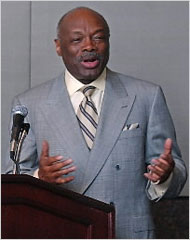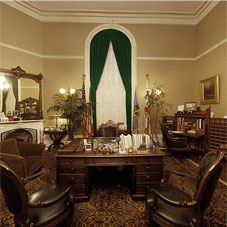
Karen Bass

Herb J. Wesson, Jr.

Willie L. Brown, Jr.

Office of the Speaker
African American Speakers of the California
Â
Legends
By Yussuf J. Simmonds
African American Speakers of the California Assembly
Even though these three individuals–Karen Bass, Herb J. Wesson, Jr. and Willie L. Brown–have demonstrated an array of possibilities throughout their public service careers, this narrative will focus primarily on their time in the California Legislature as Speakers of the Assembly. It is often stated that the Speaker of the California Assembly is the second most powerful position in the state.
Though the Honorable Karen Bass was the third African American to serve as Speaker of the Assembly, she was the first African American woman in the nation to hold that esteemed position. The Honorable Herb J. Wesson, Jr. was the second in the state; and the Honorable Willie L. Brown, known as the Dean of Speakers, was the longest serving Speaker of the Assembly in California history.
KAREN BASS.
Karen Bass was first elected in 2004 to represent the 47th assembly district which include the cities and communities of Culver City, West Los Angeles, Westwood, Cheviot Hills, Leimert Park, Baldwin Hills, View Park-Windsor Hills, Ladera Heights, the Crenshaw District, Little Ethiopia and portions of Koreatown and South Los Angeles. (Ironically, she followed Herb Wesson, both in representing the 47th district and becoming Speaker of the Assembly). Since she is termed out this year, Bass has opted to run for California’s 33 rd congressional district to succeed retiring Representative Diane Watson.
Two of Bass’ top priorities have been Foster Care Reform–for which she was instrumental in securing $82 million in the 2006-2007 state budget–and Healthy Families Insurance Coverage, a bill that she sponsored and the Governor has signed. Her background working as a community organizer gave her a sense of community-mindedness and as a result, she has been a prolific sponsor of bills relative to the quality of life for her constituents. (Coincidently, Bass played a prominent role serving as California co-chair of President Obama’s 2008 presidential campaign; and he, like she started off as a community organizer). She has also secured more than $2.3 million to help revitalize the historic Vision Theater, a cultural enclave in the Leimert Park area, of Los Angeles and more than $600 million for Los Angeles Unified School District.
As vice chair of the Legislative Black Caucus, Bass commissioned a report to research the basic demographic profile of Black Californians including the basic social and economic conditions. It triggered a statewide organizing effort to involve Black Californians in identifying their concerns and making legislative recommendations–a position that the current census is seeking to address as it relates to appropriations and representation in Black communities throughout the state, and indeed the nation.
During the 2005-2006 legislative session, Bass served as the Majority Whip and former Speaker Fabian Nunez selected her as the Majority Floor Leader for the 2007-2008 session. And as the chair of the Select Committee on Foster Care, Bass was able to bolster one of her priorities.
Her relationship with Nunez provided her with valuable insight and skilful positioning to takeover as Speaker. So when he was about to be termed out, Bass consolidated support from a number of assembly-members and as the next-highest ranking Democrat in the Assembly, she was elected Speaker on February 28, 2008 and sworn in on May 13.
In 2009, the State budget was in state of crisis. Bass jumped in with both feet to tackle it and it was reported that after negotiating three rounds of budget cuts, she became weary of deficit politics and after her first year as Speaker, she voiced that her overwhelming challenge had been to keep California going in the face of the brutal national and international economic recession. Bass pushed to create the California Commission on the 21st Century Economy and recommended that the State California adopt a flat, or flatter, personal income tax and cut or repeal corporate and sales taxes and to reduce the volatility in tax revenues. And she fought to repeal the California Citizens Redistricting Commission.
Her legislative rating, as reported in a weekly periodical covering the state legislature, ranked Bass as 91 out of a possible 100–the perfect liberal score. As one observer noted, as a strong supporter of President Obama, she would be an asset in the U.S. House of Representatives if she prevails in the upcoming election to be representative of California’s 33rd congressional district.
Bass resides in the Baldwin Vista neighborhood of Los Angeles County and her only daughter was killed in a tragic car accident four years ago.
HERB J. WESSON, JR.
In 2002, Herb Wesson, Jr. was elected unanimously as the 65th Speaker of the Assembly by his peers in the California State Assembly. He was the second African American to be elected to that post and had been there just over three years, representing the 47th Assembly District. At that time, Wesson was one of only five African Americans in the nation to serve as Speaker of a state legislature. Prior to being elected to the assembly, Wesson served as chief of staff to the 10th district councilman, Nate Holden, and to the supervisor of the second district, Yvonne B. Burke, respectively.
He had earned a reputation in public service as a strong proponent of human rights issues and those that dealt with creating opportunities related to children. Wesson presided over significant legislative successes during a difficult period in the state’s history. The state went through its most serious fiscal crisis up to that point as well as an unprecedented gubernatorial recall election–from Gov. Gray Davis to Gov. Arnold Schwarzenegger. It challenged his speakership, and indeed his leadership, as he became mostly responsible for the state of the state.
Prior to and while providing leadership for the state and the assembly, Wesson had to maintain, as one of his representative priorities, that of his 47th district constituency. These challenges did not deter his work as chair of the Governmental Organization Committee, which was responsible for reviewing legislation dealing with the Public Records Act; the State Open Meetings Act; Veteran’s Affairs gaming, alcohol and tobacco; and the Assembly Appropriations, Health, Utilities and Commerce; and Business and Professions committees. But that did not stop Wesson from authoring breakthrough legislation in education, the environment and health care, as he guided his house in passing a balanced budget during one of the worst fiscal downturn in recent state history.
Also as a legislator, Wesson focused on measures that examined the pay inequities between women and men in state jobs; ensure that children get a good start in school through mandatory kindergarten attendance; improve literacy for middle school children; and prohibit employers from requiring employees to speak English only during work hours, unless it is justified by a business necessity. These are a few of the issues that Wesson focused on while in Sacramento.
In addition, as Speaker, Wesson continually promoted workplace security for those who put their lives on the line to protect the public, including law enforcement officers, fire fighters, prison guards and the national guard, while observing the equal and civil rights protection for all Californians. Even as a Democrat, he would often reach across the aisle (to the Republicans) to broker reasonable compromise and break political logjams.
For example, Wesson brokered a political logjam that had halted new veterans’ home construction in California for years via a compromise that resulted in the building of five new homes for aging veterans–one located in Los Angeles as the first home to have a wing dedicated to the care of veterans with Alzheimer’s disease or dementia. It was this skilful ability that allowed Wesson to be unanimously appointed as Speaker in the first place; and it often allowed him to get things done in an orderly, non-confrontational manner.
After the “9/11” attacks in New York, he created the September 11 California Memorial License Plate, in memory of the tragedy: it was the most successful license plate in California up to that time and that funds raised went to support anti-terrorism programs and provided assistance to victims from California.
Wesson is widely recognized as a champion of civil justice and human rights, and has received numerous awards in recognition of his extensive service to the community. The awards include
á Ebony Magazine, 100+ Most Influential Black Americans(2003 and 2004)
á California Association for the Education of Young Children, 2003 Commitment to Children Award
á Enshrined into the “Promenade of Prominence”–Walk of Fame (2003), Los Angeles
á FAME Renaissance, 2003 Political Partner Award
á Los Angeles Council of Churches, 2003 Outstanding Community Service Award
After leaving Sacramento, Wesson became a senior advisor and special assistant to Supervisor Burke. On November 8, 2005, he was elected as a Los Angeles City Councilman representing the tenth district in a special election. Two years later, he won a full term with 99.7% and currently serves in that capacity.
Wesson is married to Fabian Wesson. They have four sons: Douglas, P.J. Herb III, and Justin.
WILLIE L. BROWN
Willie L. Brown was the longest serving Speaker of the California Assembly. He served 15 years as Speaker and three decades as an assemblyman. Even when the Democrats lost control of the Assembly, Brown, a Democrat, was able to retain the speaker-ship by winning over enough Republicans to his side. (As a matter of fact, when Brown first became speaker, he won with 28 Republicans and 23 Democrats). It was reported that term limits were instituted to be able to remove Brown from the speaker’s position.
Starting off as an attorney, Brown has carved out a niche in American politics that few have matched. He exudes charm and has a colorful personality; he is also a skillful politician–a superb legislator and masterful chief executive. Though his constituency was centered in San Francisco, he was known well beyond the boundaries of the city.
It was the landmark “Brown v Board of Education” decision that helped Brown choose his career objective. He enrolled in the University of California (UC), Hastings College of Law remembering the indignities he had experienced growing up in Texas. In 1958, he received his law degree and went into private practice. As an attorney, Brown would usually take cases other attorneys dismissed as hopeless and this earned him a reputation of defending the “defenseless.” In 1962, he ran for the state assembly but was defeated. Two years later, he tried again and was successful. When Brown arrived in Sacramento, there were three other Black assemblymen: W. Byron Rumford of Berkeley, and Mervyn M. Dymally and F. Douglas Ferrell of Los Angeles. There were no Black women in the state legislature.
As an assemblyman, Brown authored several bills that impacted minorities not only in his district but also throughout the state, and sometimes as a model for other states’ legislatures. He focused on the preservation of cultural landmarks; led efforts to have companies divest from doing business with South Africa’s apartheid government; secured protective equipment for law enforcement officials; strengthened worker’s compensation laws to detect fraud and engineered hundreds of legislative measures designed to improve the quality of life for all Californians.
During his tenure in the assembly, in addition to being the Speaker, Brown was also a UC regent, a California State University trustee, the majority leader and the youngest member to chair the powerful Ways and Means committee. He was the target of several federal investigations that often snared numerous state officials, but he always remained above the fray and was very popular among his constituents. He knew how to manage people and always knew what was going on in the state legislatures at all times.
As a result of term limits, Brown left Sacramento and in 1995, he ran for the job as mayor of San Francisco and became the first African American mayor of the city, eventually serving the maximum two terms. A skilful attorney, Brown played by the rules and at the end of his second term, he culminated almost forty years as an elected official. After leaving the mayor’s office, he continued his lucrative law practice.
In addition to practicing law, Brown hosted a radio show with Will Durst that blended humor and politics zeroing on San Franciscans’ points of view. Some of the city’s treasured institutions have been replaced with Brown’s name and some new ones have begun: Willie J. Brown Jr. Elementary School and the Willie Brown Institute on Politics and Public Service.
In 2007, Brown released his auto-biography, “Basic Brown: My Life and Our Times.”
Brown is separated and is the father of three grown children by his estranged wife: Susan Elizabeth, Robin Elaine and Michael Elliot.






